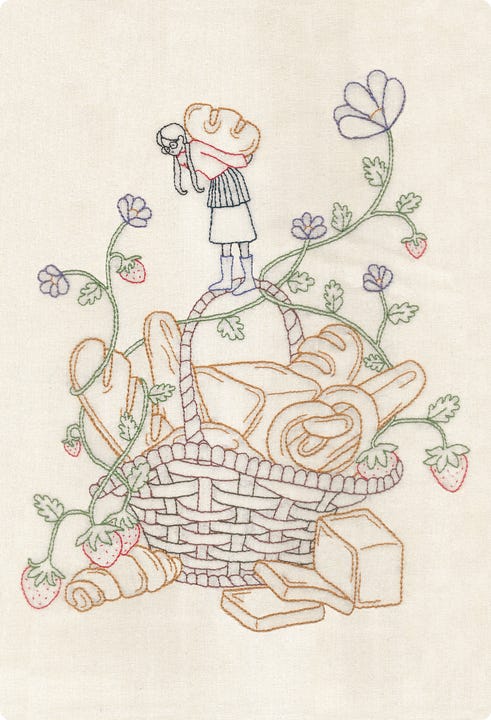Cake friends,
It’s been a busy week over here. On Tuesday, we launched a raffle to support mutual aid efforts in LA after January’s devastating wildfires, which destroyed over 16,000 structures and claimed 29 lives. It’s full of special prizes from past and present Cake Zine contributors, including a copy of our sold-out first issue Sexy Cake and a romantic meal for two at Ha’s Snack Bar, the coolest new restaurant in NYC from a cult-favorite pop-up.
Tanya is offering plated dessert at a private dinner party for up to eight people, and Aliza is sharing a virtual, private freelance pitching workshop. And that’s just the beginning—there’s writing feedback, Thai dessert workshops, stunning jewelry, limited-edition tattoos, and so much more. Check out the prizes and enter for your favorites before the raffle closes on February 20.
Yesterday, we met up with a group of volunteers at the Migrant Kitchen Initiative to pack meals, decorate cookies, and make Valentines for food insecure New Yorkers. Thank you to everyone who signed up for this—we hope to do more community care events with a bigger capacity in the future.
And today in the newsletter, we’re sharing a special excerpt from Daily Bread from the great Larissa Pham.
The Temple and The Tradwife
When I left New York City last September to live upstate with a man, I immediately began baking. The first loaf cake I made was terrible: eggy, over-mixed; its one redeeming quality was the layer of apple chunks I’d tossed in. Our rental, a rich family’s vacation cottage that we’d live in for the nine months of the off-season, was furnished, but came without measuring cups. I’d used a rice-cooker cup to measure flour; when I sliced the loaf open, the top had fallen, the ratio of wet to dry ingredients wrong.
I improved thereafter, buying parchment paper, real measuring cups, and a kitchen scale from Sur La Table. Learned how to cream butter and sugar, how to fold in flour, how to whisk eggs until they grew pale and frothy and became the same pastel color as sugar with orange zest. I made a spiced cinnamon sugar loaf; an ube swirl cake; endless batches of chocolate chip cookies, trying to find the perfect ratio of chew to crisp to spread.
Baking felt like a compulsion, a bodily urge. It soothed my anxieties about moving, about leaving the city and all my friends in it, about leaving my girlhood of roommates and karaoke bars behind. But there was also, almost immediately, a wifely quality to my work in the kitchen. It wasn’t that my partner didn’t cook—he does—but I was the one who baked, and I loved it. I loved who I became when I baked: a calmer, more precise person who turned raw ingredients into gold. Why, then, did baking seem to make me closer to something I didn’t understand and wasn’t sure I wanted to become, which was a wife?
I had decided to leave the city in the spring of 2023, not long after Ryan and I returned from a trip to Vietnam. I had never lived with a partner before, and it felt insane to tear myself from the city I’d lived in for nine years. But it was true that I had come to resent the way New York was changing, all the places where I used to hang out overrun with content creators or shuttered by rising rents, that I desperately wanted to finish a novel but wasn’t getting any writing done, and that I loved Ryan, and I wanted to live my life alongside his.
And it was true, too, that I had only decided to move upstate after my first visit to the temple where Ryan had lived for two years. Set into the side of a mountain upstate, overlooking miles of farmland and marsh, the temple was the heart of a community—a sangha, to use the Buddhist term. The sangha encompassed temple residents as well as locals who lived in the neighboring town.
I came for a long weekend in April, to see the place where he had lived. The schedule began at 5:30 a.m.; as the newest visitor, I was tasked with ringing the wake-up bell. Brush teeth, have tea, be in the zendo by 5:55 a.m., upright on the cushion. On the first day, I felt resistance: I didn’t know anyone here; I was tired; and because of the temple’s configuration, Ryan and I weren’t even able to sleep in the same room. By the second morning, I realized all of that was the point: The temple was a container into which I could fluidly dissolve. It didn’t matter how I looked or what I felt, or for that matter, how anyone else looked or felt. There was no miasma of social niceties I had to worry about navigating, only the simple tasks at hand: to cook, to clean, to feed the community and keep the temple running.
After meditation, work. In the garden, on my knees in the dirt, planting beet seedlings and halved potatoes. Washing dishes after communal meals. A shift in the kitchen punctuated by the rhythmic chopping of daikon radishes into paper-thin slices, by the crackle of a serrated knife slicing into crusty home-baked bread. If this sounds austere, I promise it wasn’t. There was a warmth to every action, a care I felt manifesting around me in the communal body of others, a friendliness that welcomed me in, and which filled me with a solid, bright, peace. I felt myself steeping in the quiet like a dry leaf in tea. Colors and fragrances blossoming. Another life was possible, was in fact already happening. Here, in the mountains, next to the garden and the compost and the undulating fields of goldenrod. A life with others—supported with others—in community.
Driving back down to the city, I said: Let’s do it. Let’s move here.




Read this piece in lit hub and loved it! Larissa Pham is brilliant!